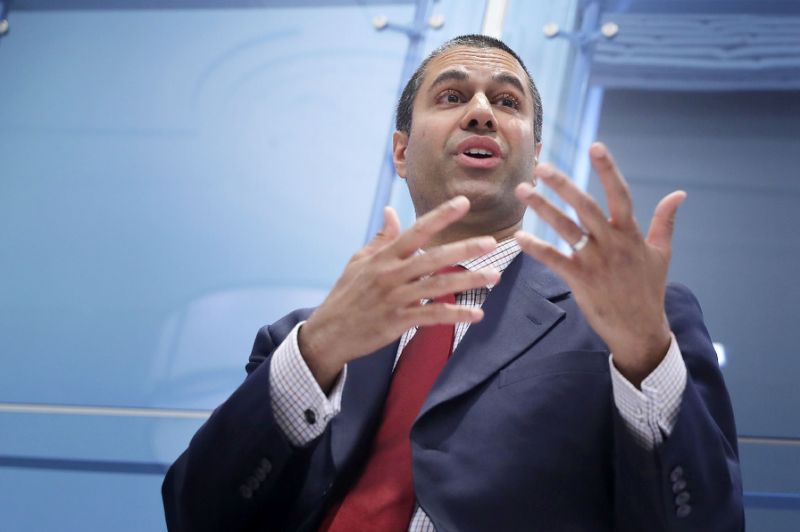The Federal Communications Commission chairman who wants to hit the Delete key on the FCC’s current net-neutrality rules has one thing to say to his critics: Why the long face?
FCC chair Ajit Pai made his case for repealing the open-Internet rules championed by his Democratic predecessor Tom Wheeler at an event in Washington hosted by two free-market-minded groups, the R Street Institute and Lincoln Network.
Part of Pai’s argument consisted of a reasonable point: Are any providers seriously trying to block sites or charge others for priority delivery of their data — the things that net-neutrality rules ban? If they aren’t and won’t, then why not scrap regulations that internet providers say have discouraged them from building out their networks to give customers more choice?
Pai then suggested we stop worrying about what our internet providers might do, even though many of us can’t drop them without switching to far slower alternatives. Instead, he said we should really worry about how social networks treat conservative voices.
Problem? What problem?
Pai did so by verbally jousting with tweets from celebrities angry over his proposal and the possibility that it would let internet providers block or slow sites they don’t like. Think of Kumail Nanjiani warning that “We will never go back to a free internet,” Mark Ruffalo decrying this grant of power to telecom companies as “the Authoritarian dream,” or Alyssa Milano classifying it as “one of the biggest” threats to our democracy.
Pai scoffed at these predictions of doom — “I’m threatening our democracy? “Really?!” — and asked for evidence that internet providers would actually start carving up broadband service similar to cable TV.
In particular, he criticized a graphic of Portuguese mobile-broadband pricing that went viral in a tweet from Rep. Ro Khanna (D.-Calif.) showing surcharges for video, social, music and other categories of apps.
The actual offer, as you can see at Portuguese telco MEO’s site, lets subscribers pay to exempt particular apps from their plan’s data cap. That’s acceptable under current European Union regulations — and under U.S. rules too, as seen when wireless carriers exempted streaming-video services from their data caps under Wheeler’s term.
Yahoo Finance’s parent firm, Verizon (VZ), was among them.
Alternative history
Wiping away the regulations adopted in 2015, Pai said, would take us back to the good old days when internet providers didn’t have to worry about getting a permission slip from the FCC.
“Until 2015, the FCC treated high-speed internet access as a lightly-regulated information service,” he said. “The internet wasn’t broken in 2015.”
But the regulatory foundation Pai says amounts to “Mother-may-I” regulation — Title II, from the Communications Act of 1934 that established the FCC — governed broadband access until 2002, when the FCC let cable ISPs out of it; it freed phone-based digital-subscriber-line broadband three years later. The FCC even used that authority to force phone companies to open their DSL networks to competing ISPs.
The golden age Pai talks up really dates to that 2005 opening up of the rules — after which many telecom CEOs spent a lot of time talking about how they wanted to charge the likes of Google (GOOG, GOOGL) for access to their subscribers. Pai didn’t talk about that.
He did, however, tout the ability of a different regulator, the Federal Trade Commission, to bring cases against providers that don’t disclose favorable or unfavorable treatment of particular sites, or who act unfairly or anti-competitively. Instead of the government telling internet providers how to act, it will go after them when it sees actual harm happen — something another speaker at the event, acting FTC chair Maureen Ohlhausen, pledged to do.
Meet the real enemy: social networks
Then Pai pivoted to suggest the real risk to an open internet was “edge providers” — companies like Google, Facebook (FB) and Twitter (TWTR) that help circulate much of America’s news and debate and can be crucial to making money off it.
“Edge providers are a much bigger actual threat to an open internet,” he said, pointing to examples like Twitter briefly refusing to let Rep. Marsha Blackburn (R.-Tenn.) promote a tweetthat implied that Planned Parenthood sells baby parts (it doesn’t) or Google ruling some YouTube videos from commentator Dennis Prager off-limits to advertisers.
(Google does sometimes make the wrong call about whether a video is “advertiser friendly.”)
Pai also cited the web-security firm Cloudlfare’s unease over being able to decide what goes online. He didn’t mention the case that led CEO Matthew Prince to express this unease: the company’s post-Charlottesville decision to drop the Nazi site Daily Stormer when its leaders claimed Cloudflare supported them. Isn’t firing your customer a business prerogative Republicans support?
Heat and hype
Pai also left out mention of a different sort of racist speech online — the kind directed at him since last week’s announcement, including right outside his house.
”The debate needs, and our culture needs, a more informed discussion about public policy,” was all he said about that. “Hysteria takes us to unpleasant, if not dangerous places.”
He’s right. But that observation goes both ways: Calling this repeal proposal “restoring internet freedom” is its own form of hysteria, since neither his rules nor the old ones say anything about what citizens can say or do online. Consider two things his FCC colleague Mike O’Rielly — who, like Pai, was appointed by President Obama in keeping with the tradition of having both parties represented on the commission — said during the event.
“The light of internet freedom was nearly extinguished.” O’Rielly said of the 2015 vote to enact net-neutrality rules. Then he declared that “We will let facts prevail over hyperbole.”
Well, which one will it be?

